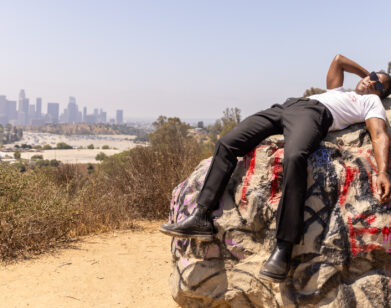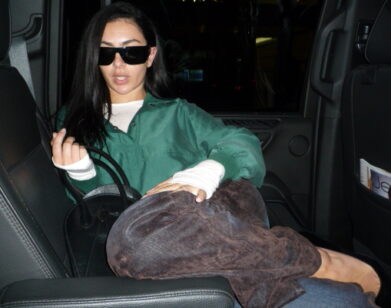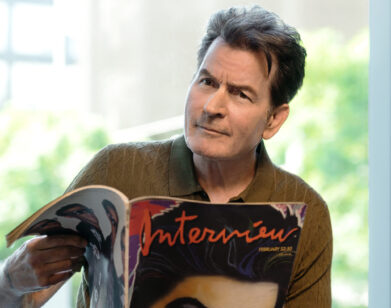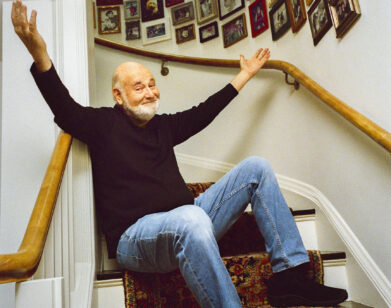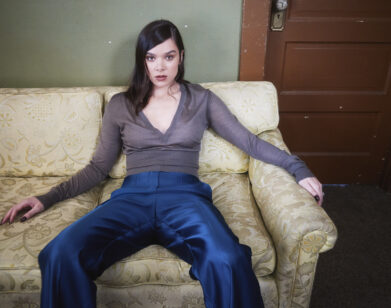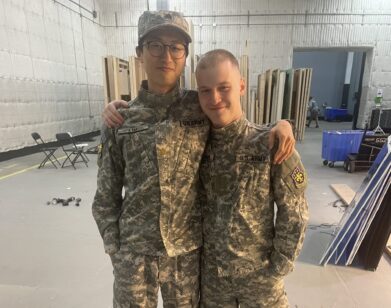Olivia Wilde Takes Center Stage
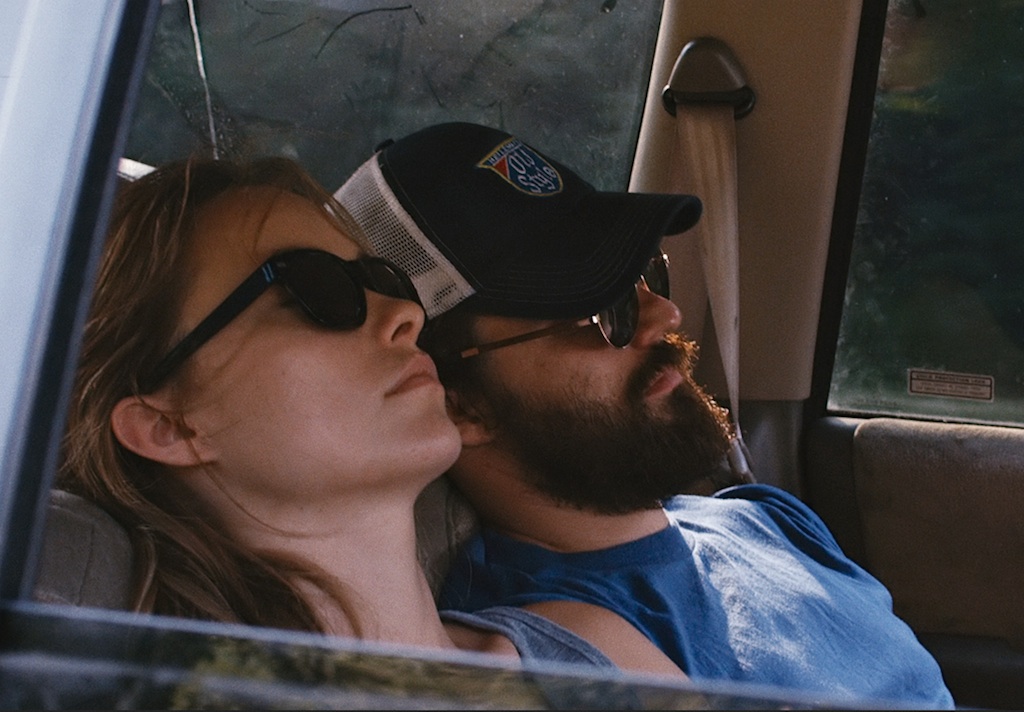
ABOVE: OLIVIA WILDE AND JAKE JOHNSON IN DRINKING BUDDIES. PHOTO COURTESY OF MAGNOLIA PICTURES.
Kate and Luke are best friends. Or maybe they are more than best friends. Both in their late 20s, Kate (Olivia Wilde) and Luke (Jake Johnson) work at a small brewery in Chicago. Their relationship is fueled by beer, silly ideas, and, as Olivia Wilde tells us, arrested development. When Luke’s longtime girlfriend Jill (Anna Kendrick) goes away for the weekend, however, Kate and Luke have to face up to their longstanding flirtation.
Directed by Joe Swanberg, Drinking Buddies is an improvised indie with an intriguing cast that also includes Ron Livingston, Ti West, and a brief appearance by Wilde’s real-life fiancé Jason Sudeikis. Drinking Buddies is Olivia Wilde’s first time carrying a film, but it is certainly not her last. With upcoming roles in everything from Rush to Spike Jonze‘s Her and Paul Haggis’ Third Person, Wilde is the girl of the moment.
EMMA BROWN: Do you remember the first time you had a beer?
OLIVIA WILDE: Well, my dad is Irish. I spent my childhood going back and forth between Ireland and America. True to Irish cultural tradition, people drink beer younger there in the way that Italians drink wine younger, I assume. We in Ireland love a beer. So I think I was about 13.
BROWN: Oh, that’s not that bad.
WILDE: Not too bad. I could have said seven. That would have been more shocking. [laughs]
BROWN: My dad used to give me beer when I was seven. But just a little bit.
WILDE: Just enough. Just enough to shut you up.
BROWN: Exactly. Your character Kate is obviously having a hard time. What would you say to her if you were her friend?
WILDE: I feel that in her early 20s, Kate was probably the best person to hang out with—the most popular, just having a great time, flying by the seat of her pants, not conforming, doing what she wanted to do and loving it, having a series of non-committal relationships. Just enjoying herself. But [now she’s] hitting this point where it’s not necessarily cute anymore to live in such chaos. I think that I would tell her to take all the energy that she was putting into maintaining this kind of cool cucumber, collected vibe on the surface, and just put it into herself and love herself more. I think it would calm her. I would probably tell her to be sober for a little while. [laughs] It’s maybe the first thing I’d say: “Kate, man, you should just take a few months off work. Ask for a sabbatical. Let’s go on a healthy trip, get you out of Chicago for a little while.”
BROWN: Do you think that Kate and Luke would make a good couple?
WILDE: Not at this point in their lives; the thing that makes them such good friends is exactly what stops them from being a good couple. I think that Kate is not a very sensitive person. She’s a great person for Luke to hang out with because she’s low-maintenance: she can take it as well as she can dish it, she’s easy to hang out with, and she’s tough. You don’t really have to baby her in any way—she rejects coddling of any kind—and she’s fun. But that lack of sensitivity that may make her a really easy, breezy friend is exactly what makes her a bad fit for him as a romantic love because she’s not incredibly nurturing. Kate needs someone who’s sensitive and nurturing. She and Luke are almost too intensely similar. It’s like the two sides of a battery.
BROWN: There are moments when Kate and Luke’s relationship seems harmlessly flirtatious, and other moments when it feels like emotional infidelity.
WILDE: I think that women are more sensitive to emotional infidelity than men. I think men are more scared of physical infidelity. So it’s interesting to see the reaction to this movie, how women find their relationship more inappropriate than men do. The other interesting thing is married men think Kate is way too hectic to be appealing; single men think she’s the dream woman. I’ve been trying to understand what it is about her—she’s sort of a wild animal, you can’t cage her, you can’t own her, so she doesn’t want to own anyone else. That makes her awesome for a single guy who wants a really fun girlfriend but for a married man, the reaction seems to be she would break your heart and she’d be exhausting.
BROWN: I feel like if I were Jill, I would feel threatened by Kate, but she seems completely cool with it.
WILDE: Jill’s an awesome character. Anna Kendrick is so smart and so good at what she does—she created this complexity that made the movie and the tension between the characters work. If she had played Jill as this one-dimensional, boring, goody-two-shoes girl, the audience would just be screaming for Luke to end up with Kate. I think that she’s not intimidated by Kate; Kate is certainly intimidated by her. Jill seems like she’ll be a great mom. Kate would like to be a mom but she can’t even be a mom to herself. She aspires to have more of Jill in her and it kind of kills her that she doesn’t. She feels like there’s a chip missing in her that doesn’t allow for her to be this nurturing, maternal woman.
BROWN: Do you think she could ever be like Jill?
WILDE: Yeah, I see a lot of growth in Kate’s future. I think she may need to stumble a bit more in order to find it. I respect that she’s the girl who gets up and goes skinny-dipping. I respect a lot of her choices. But I do think that she wants to have someone tame her a little bit or give her a safe place to fall. When we were shooting, I was saying she’s a Tasmanian devil: she kind of wants someone to stop her from spinning and hold her really tightly and she thinks that person is Luke.
BROWN: The film had no script. Does improvising all of your dialogue make you feel closer to your character?
WILDE: Yeah, because a lot of my dumb jokes are in the movie. [laughs] And mannerisms. She’s different than me in many ways, but friends of mine watch the film and say, “This is a lot like hanging out with you.” I learned a lot about relaxing on film in this movie. Learning to just be is something that’s kind of difficult with a camera in your face. [Improvising] allowed for a lot of good choices that I don’t necessarily know we would have made if it had been scripted. For instance, there’s a scene where I lay down in my bed with a sleeping Luke and I spoon him while he’s sleeping that happened just by chance. All we knew—all Joe [Swanberg] knew—is, “Luke is sleeping. What do you think you would do?” And I said, “Well, I think she wants to be close to him. She’s not sure what this weekend they’re having alone is going to do to their friendship.” I think she wants it more than he does, she wants them to cross a line and the chance to have that intimacy. So it’s this kind of inappropriate thing that she does by sitting down on the bed and laying down. Now, when I laid down on the bed Jake’s body, just because of my weight, fell back into me, so then I put my arm around him. It happened by chance. If that had been in the script, I think I would have thought, “That’s too much. She seems creepy. She lays down and spoons him in his sleep—it seems weird.” But that happened because of the nature of the process. So things like that throughout the film really made me appreciate Joe and his directing style and everybody’s freedom.
BROWN: How long did it take you to get comfortable enough to be able to follow your instincts like that?
WILDE: Pretty quickly because we didn’t have very much time before we started shooting. We had a couple days. The first scene in the movie is the first scene we shot, so there was a certain amount of chronological shooting, which really helped. The last day of shooting I thought, “I want to make every movie like this. Now I feel warm, I feel loosened up and ready to do anything.” I wasn’t afraid of anything. And it had an effect on how I approached the movie I shot right after and certainly every movie I shoot from here on out.
BROWN: What was the movie you shot right after?
WILDE: I made a movie called Third Person for Paul Haggis with Liam Neeson and a bunch of amazing actors—Mila Kunis, James Franco, Adrien Brody. I definitely felt a little more bold in my choices and I think that was a result of Drinking Buddies.
BROWN: During the credits, Jason’s character Gene Dentler is listed as playing “himself.” I liked that.
WILDE: [laughs] I thought that was kind of a slick move.
BROWN: How did Jason get involved in the film?
WILDE: Jason was visiting me in Chicago right before he went to shoot a film and he happened to be on set and I said, “Hey, we have no one to play my boss. Do you think you could come in and improvise with me for an hour?” And that’s what Jason does best. He worked for a long time at Second City and we’ve improvised together at UCB as well. So he said sure, and we didn’t know what the nature of the character would be and he came up with this hilariously awkward, socially anxious guy and I loved it. It was really fun. I’m just in awe when I watch him work. In that scene, I think I’m just stifling giggles most of the time. It was really fun to have him in it and we felt very lucky. He’s really a titan in the world of improv—he’s very well-respected—so for our community and for this movie it was just very cool to have him be a part of it.
DRINKING BUDDIES IS AVAILABLE VIA VOD NOW AND WILL OPEN IN LIMITED RELEASE THIS FRIDAY, AUGUST 23.

